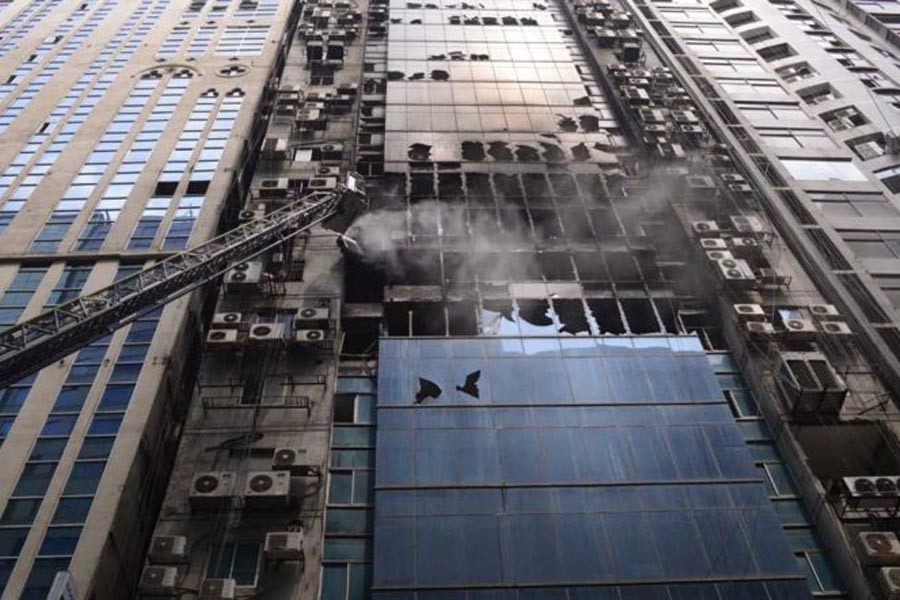The blazing fire in Banani's FR Tower that claimed lives of at least 25 people and left more than 100 injured Thursday has again brought to the fore flaws in the construction of high-rise structures in Dhaka, lack of internal fire-extinguishing capacity and inadequacy on the part of the official fire-fighting agency to meet all exigencies. Casualties of the latest fire, it is believed, would have been far less without those deficiencies. However, in line with the past tradition, already a number of committees have been formed by the fire department and the disaster management ministry to look into the cause of the fire and other relevant issues.
People are genuinely sceptical about the outcome of such committees. In almost all the cases, reports produced by the committees are pushed under the rug by the officials concerned. Had the government implemented even a part of the recommendations made by the different committees in the past, onlookers would not have to watch from a distance with horror the people trapped in the FR Tower inferno jumping from top floors or being charred to death.
Students of a private university who watched the disaster progressing from the rooftop alleged that firefighters came late and ill-equipped. By the time fire-fighting vans with modern equipment and gear reached the spot, fire had spread to a number of top floors. Yet the courage and determination demonstrated by the firefighters, students and locals in the rescue of the people trapped in the fire-stricken building are commendable. The combined efforts of the Armed Forces’ units in the rescue and medical treatment of the victims were especially helpful in that kind of an exigency .
The fires at Chawkbazar of Old Dhaka and FR Tower in the posh Banani do highlight one particular fact – structures built either in narrow and crowded areas or beside wide roads and modern residential or commercial areas are equally vulnerable to fire. Only difference is that firefighting vehicles face difficulty in reaching the spot in Old Dhaka since the roads and lanes are narrow there. Other conditions remain the same. In both places, buildings lack their own primary fire-fighting capabilities. They do not have fire-escapes also. Nor they make provision for sufficient water reservoir to face fire-like emergencies.
Following the devastating fire that destroyed a large part of the Dhaka North City Corporation market at Gulshan, a number of committees were formed to look into state of preparedness to handle fire incidents in high-rise structures in Gulshan, Banani and other parts of the city. The Rajdhani Unnnyan Kartipakkha (RAJUK) in particular has to explain why it did not ensure construction of a fire escape in the FR Tower. Field visits might help detect many such violations of building code, even in posh commercial-cum-residential areas.
Scarcity of sufficient water needed to douse fire appears to be one major problem faced by the firefighters. Modern cities are equipped with roadside hydrants to facilitate firefighting. The idea of building hydrants might come as an absurd one to the Dhaka Water and Sewerage Authority (DWASA) because of the fact it has been failing to meet the drinking water requirement of a large part of the population in the capital city. Yet it should consider building a few hydrants in some selected areas to help fight fires.


